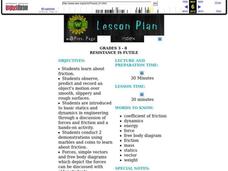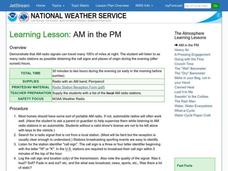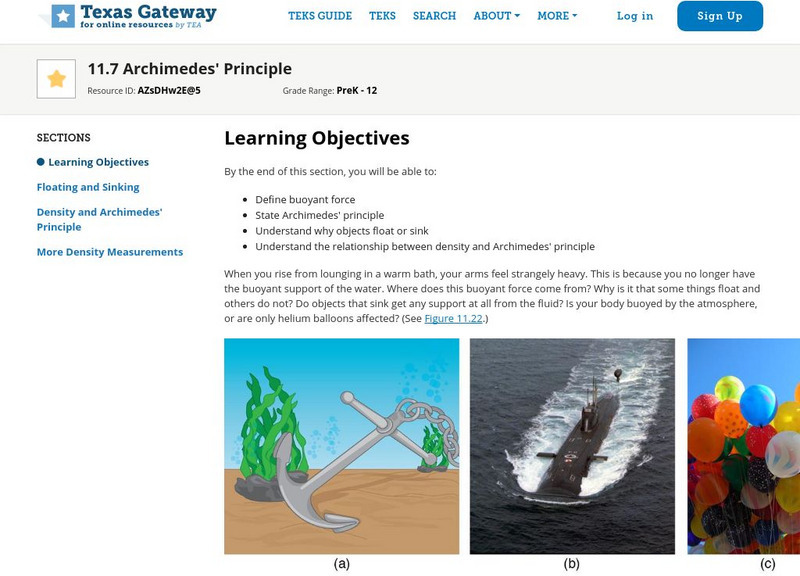Curated OER
Sliding and Stuttering
Ninth graders use a spring scale to drag an object such as a ceramic coffee cup along a table top or the floor. The spring scale allows them to measure the frictional force that exists between the moving cup and the surface it slides on....
Curated OER
Jupiter's Weather Forecast
Students read information about Jupiter and the planet's weather. In this Jupiter weather lesson, students read information about Jupiter's weather. Students study a chart about the weather on Earth and Jupiter. Students read a weather...
Curated OER
Electroscope
Students examine what an electroscope is and who invented it. In this electrical lesson students build their own Emergency Radiation detector Electroscope.
Curated OER
Newton's Laws of Motion
Students investigate the effect of thin films to surface friction. In this physics lesson, students calculate the coefficient of friction using mathematical formulas. They discuss its importance in their everyday lives.
Curated OER
Electricity/Magnetism
Second graders experiment with ballons to see which objects will cling and which objects will not. They use an assortment of objects, paper clips, pennies, button, scraps of paper, or puffed cereal. They make predictions and record results.
Curated OER
Lightning It's Shocking, It's Frightening, It's Lightning!
Third graders decide what they want to explore lightning, how to go about finding the answers, and deciding what skills they need to further study some of their questions.
Curated OER
Coefficient of Kinetic Friction and Surface Area
Young scholars investigate coefficient of friction with respect to surface area and applied force in contact with the sliding force.
Curated OER
Everybody It
Students are in scattered formation within the playing area. The activity begins with all of students being "it". They move about the general space tagging various classmates while avoiding being tagged.
Curated OER
Learning Activities: Observing Using Sight
Young scholars describe how diffusion occurs within a liquid. They explain a situation where diffusion through a liquid might occur in the natural world.
Curated OER
RESISTANCE IS FUTILE
Students explore friction and use objects such as coins and marbles to study the concept.
Curated OER
Types of Forces
Students study scientific names and descriptions of forces. In this motion lesson plan students organize information into a graphic organizer then teach it to other students.
Curated OER
The Treaty Trail: U.S. Indian Treaty Councils in the Northwest
Students create a timeline with the major events of the 19th and 20th century dealing with Native Americans. They examine artifacts and discuss how they reflect culture. They also identify trade routes the Native Americans used.
Curated OER
Learning Lesson: AM in the PM
Students discover how AM radio signals can travel at night. They listen for a radio station not in their immediate area and log the call sign and the location of the station. They discuss the difference in transmissions during the night...
Curated OER
TE Activity: Write On!
Students write a book, newspaper, or other chose published writing that explains the connection between engineering and the environment. They determine why engineers need to be good communicators.
Curated OER
Air Masses
Students examine the physical characteristics of several types of air masses to discover how air masses can be identified and defined by their temperature and moisture content.
Curated OER
Lab for Truss Design and Testing
Students design and build their own truss. In this physics lesson, students calculate the forces and maximum load. They complete a full scale diagram of their design.
Curated OER
Losing An Island
Students examine carbon dioxide and determine the impact of greenhouse gases on the earths spheres. In this pollution lesson students complete a lab activity to see the impact of gases on the environment,
Science Education Resource Center at Carleton College
Serc: Investigating Static Electricity: Creating Lightning on Much Smaller Scale
In this elementary science activity, students will experiment with static electricity using balloons. After investigating how balloons attract and repel various objects, students will watch a simulation of static electricity to help gain...
Physics Classroom
The Physics Classroom: Static Electricity: Newton's Laws and Electrical Force
How do Newton's Laws connect with electrical forces? This overview illustrates how they blend together. After studying this explanation, test understanding with the review questions provided.
Physics Classroom
The Physics Classroom: Static Electricity: Lesson 3: Coulomb's Law
Pay close attention to the three variables between two charged objects, Coulomb's Law is the quantitative expression of these variables. Understand the purpose of the law and extend the understanding through Coulomb's Law Interactive...
Physics Classroom
The Physics Classroom: Static Electricity: Lesson 1: Polarization
Students will understand the meaning and application of polarization with this detailed explanation which includes links for hands on learning and comprehension questions.
Texas Education Agency
Texas Gateway: Ap Physics: Fluid Statics: Archimedes' Principle
By the end of this section, you will be able to define buoyant force, state Archimedes' principle, understand why objects float or sink, and understand the relationship between density and Archimedes' principle.
Physics Classroom
The Physics Classroom: Vectors: Forces in Two Dimensions:equilibrium and Statics
Through examples and practice problems, this interactive tutorial helps students understand forces that are in a state of equilibrium with a net force of zero.
Khan Academy
Khan Academy: Static Functions vs. Instance Methods
Understanding and programming vectors and the PVector object: the difference between using static functions and instance methods.




















